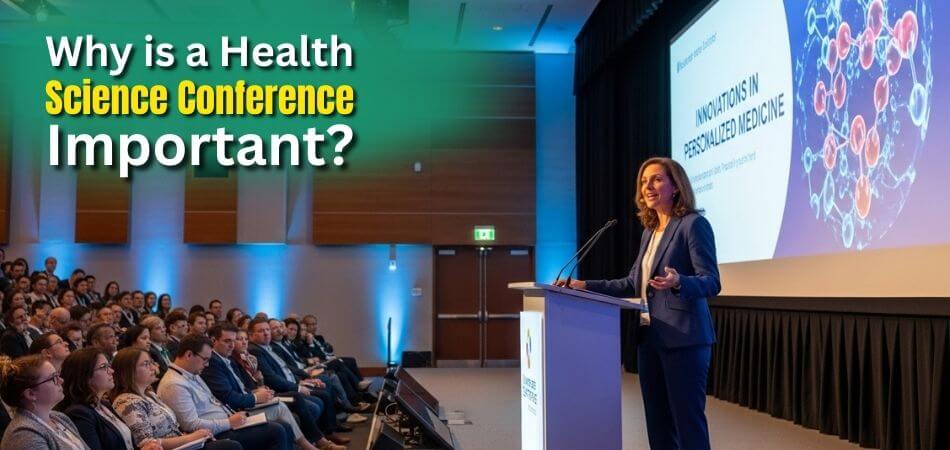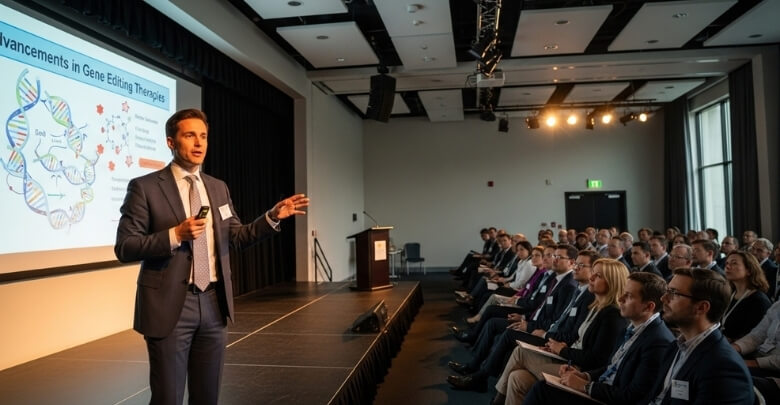Health science has always been a field that thrives on new knowledge, shared discoveries, and collaborative efforts. Professionals, students, and researchers constantly seek opportunities to learn, connect, and grow in ways that benefit both their careers and the wider community. But why is a health science conference important?
A health science conference is important because it creates a platform where people share research, explore new discoveries, and discuss healthcare challenges. These gatherings also allow participants to meet experts, ask questions, and exchange ideas. The combination of learning and networking makes conferences vital for growth, recognition, and advancing global healthcare together.
If you are considering the next step in your academic or professional path, attending a health science conference can be the opportunity that sets you apart. Explore the upcoming events, prepare to share your ideas, and take the chance to connect with people who can inspire and support your growth.
Why is a Health Science Conference Important?
Health science conferences focus on improving healthcare and health. It brings together doctors, students, researchers, and leaders to share ideas. These events show new tools, teach new skills, and help solve real health problems. By attending, people learn, connect, and help improve healthcare for everyone. To see why they matter, let’s look at the key benefits these conferences provide.

Knowledge Sharing
Health science conferences are great places to share ideas and discoveries. Researchers talk about their new studies and solutions. Students and professionals listen, learn, and understand the latest updates in healthcare. This exchange of knowledge helps everyone grow and think in new ways.
Sharing knowledge also makes research more useful. It turns difficult studies into steps that can be used in real life. Doctors and nurses learn better methods to care for patients. This process makes healthcare stronger and more effective in different communities.
Networking Opportunities
Conferences are also about meeting new people. Doctors, researchers, and students get the chance to talk with one another. These conversations often lead to teamwork and new projects. Making strong connections at conferences helps people grow in their careers.
Networking also brings different groups together. For example, health workers can meet technology experts or government leaders. These talks can create new plans that improve healthcare systems. By networking, people gain fresh ideas and feel part of a global health community.
Professional Development
Workshops and sessions at medical gatherings teach new tools, methods, and skills that go beyond daily work or school. Attendees return with knowledge that makes them better at their jobs. This kind of learning is crucial as healthcare keeps changing quickly.
Such events also build confidence. Presenters practice sharing ideas while listeners strengthen problem-solving and critical thinking skills. The environment inspires participants to keep improving themselves.
Policy and Community Health Impact
Discussions at health science meetings often influence policies. Leaders and experts talk about problems faced by communities and suggest solutions. These insights can improve hospitals, clinics, and public health services. Policies shaped from such conversations help more people access better care.
Local health projects are also inspired by these events. When one group shares success stories, others can apply the same approach. In this way, good ideas spread widely and bring lasting improvements to community health.
Technology Showcase
Many conferences highlight the latest health technology. Companies present machines, tools, and apps that help patients, giving attendees the chance to see how these innovations work in practice. Staying updated keeps professionals ready to use modern solutions.
Technology showcases also connect inventors with users. Innovators learn how their tools solve real problems, while professionals discover ways to apply them in daily practice. This exchange speeds up the adoption of new healthcare technology.
Collaborative Research
Research collaboration becomes easier when experts gather in one place. People with similar projects can form teams, leading to stronger studies and faster discoveries. Working together accelerates progress and makes it more effective.
Partnerships also save time and effort. Sharing results prevents duplication and allows researchers to build on one another’s work. This teamwork helps bring new health solutions to the world more quickly.
Health science conferences are more than events; they are platforms for progress, innovation, and change. From knowledge sharing to collaboration, each conference strengthens global healthcare. Countries like Canada, with renowned conferences in Vancouver, stand alongside the USA and Germany as global hosts. Attending such gatherings is a chance to learn, connect, and help shape the future of health.
Who Benefits the Most From Attending Health Science Conferences?
Health science conferences are lively events where people gather to learn, connect, and share knowledge. These gatherings bring together experts, professionals, and students from many different areas of healthcare. Everyone comes with ideas, questions, and a strong interest in improving health. The real value lies in what people gain by being part of such events.
Professional Growth
Doctors, nurses, and other healthcare workers learn new things at these conferences. They attend workshops and sessions that explain the latest treatment methods. This helps them improve their skills and take better care of their patients. Conferences also allow professionals to keep up with fast-changing healthcare trends.
Research Benefits
Researchers benefit a lot from presenting their work. They share their studies with a wider audience and get useful feedback. These conferences also show them what other researchers are discovering in the field. Meeting new people can even lead to partnerships and fresh ideas for future studies.
Building Connections
Conferences are great places for making new professional friends. Doctors, researchers, policymakers, and industry experts all come together in one space. Talking to different people often opens doors to projects and future career opportunities. These connections can help everyone work together for better healthcare progress.
Learning New Tools
Conferences display the newest medical tools and technologies. Attendees see how these tools work in real life. Learning about such advancements helps professionals bring better solutions into their daily practice. It keeps them updated and ready to use the best options for patients.
Academic Growth
Students and young professionals also gain a lot at these events. They can present their research and get noticed by experts. Such opportunities build confidence and help them grow their reputation in the medical community. Attending conferences often boosts both knowledge and career paths.
What are the Key Topics Covered at Health Science Conferences?
Health science conferences bring people together to discuss major issues in medicine and healthcare. These gatherings cover the following areas that matter for doctors, researchers, and communities. Each topic highlights new ideas, solutions, and tools that can improve health worldwide.
Public Health and Epidemiology
- Public health sessions often explain how different environments affect diseases and prevention. Experts share data that improves decision-making and strengthens community awareness.
- Global discussions explore how health policies and economics shape communities. By comparing strategies, participants find better approaches for protecting large populations.
Medical and Clinical Sciences
- Presentations include laboratory discoveries that lead to better diagnostics. Attendees learn how these advances can improve early treatment success.
- Clinical sessions also focus on rehabilitation and palliative care. Professionals exchange methods that make care more supportive and patient-friendly.
Digital Health and Technology
- Talks often showcase new digital systems for patient care. Professionals see how telemedicine or records improve real-time healthcare delivery.
- Presenters explain how artificial intelligence changes decision-making. By using smart tools, doctors find ways to make quicker and safer choices.
Patient Care and Engagement
- Sessions highlight personalized medicine and patient tools. Attendees learn how tailored treatments create stronger trust and improved outcomes.
- Mental health discussions share simple practices that support well-being. By promoting equity, healthcare access becomes fairer and effective.
Pharmaceutical Sciences
- Topics include vaccines, drug trials, and safety monitoring. Researchers explain how careful testing ensures safer medicines for patients worldwide.
- New delivery methods are also discussed. Experts show how improved systems help treatments reach people more quickly and effectively.
Healthcare Management and Policy
- Conversations explore funding systems and ethical responsibilities. Leaders compare strategies to ensure fairness while keeping healthcare costs manageable.
- Sessions also highlight sustainability and quality. Professionals discover how long-term planning keeps care efficient, reliable, and accessible for everyone.
Specialized Health Topics
- Presenters explore areas like geriatrics, reproductive health, and child wellness. These sessions explain unique needs often overlooked in healthcare.
- Emergency and occupational health issues are discussed. By learning from real examples, attendees prepare for disasters and protect worker safety.
Health science conferences cover an incredible range of important topics, from prevention strategies to innovative technologies. In places like Canada, many participants consider practical details such as travel, accommodation, and the overall cost to attend a health science conference in Vancouver, Toronto, or other major cities. Besides New York and Mexico, these destinations stand out as leading hosts for events that not only educate but also create opportunities to shape better healthcare for future generations.
What Are the Latest Innovations Showcased at Health Science Conferences?
Health science conferences in 2025 highlight many new ideas that are shaping modern healthcare. These events focus on smart technologies, creative treatment methods, and new healthcare systems. Experts share tools that make healthcare faster, safer, and more personal. Here are the innovations at the conference that help professionals improve care for patients worldwide:
- Artificial Intelligence: AI tools support doctors by improving diagnosis accuracy and suggesting treatment plans. These systems also transform drug development, trials, and overall medical research.
- Smart Wearables: Connected devices monitor patients outside hospitals and provide real-time health data. These wearables help people manage chronic diseases and encourage daily wellness.
- Data Care: Big data systems analyze health records and patterns for predictive medicine. This approach helps doctors customize treatments and improve patient outcomes effectively.
- Telemedicine Growth: Virtual platforms allow easier access to doctors from home. These models save time, increase efficiency, and improve care after the pandemic.
- Workforce Tools: New healthcare systems reduce stress for providers and improve their productivity. By preventing burnout, professionals stay healthier and work more effectively.
- New Therapeutics: Next-generation diagnostics and vaccines are shared at conferences. These discoveries in lab science and biotechnology open fresh doors for effective treatments.
- Nutrition Models: Food-as-medicine programs link nutrition with better care. Other sessions explore behavioral health solutions for substance use and mental health challenges.
- Global Partnerships: Countries collaborate on global health policies to solve shared challenges. These partnerships also improve equity and strengthen international healthcare systems.
What Networking Opportunities Do Health Science Conferences Offer?
Health science conferences are not just about presentations and lectures. They bring people together in ways that create lasting connections. Professionals, researchers, and students find plenty of chances to talk, share ideas, and build trust. These networking opportunities often turn into real opportunities for growth and teamwork:
Interactive Sessions
Workshops and group activities give people the chance to talk openly with one another. Sharing ideas in smaller groups makes conversations feel natural and easy. Attendees often meet others working in similar fields or with the same goals. These sessions help everyone connect while learning something useful.
Coffee Breaks
Short breaks with coffee or lunch create casual settings for meeting new people. Conversations often start with simple greetings but lead to shared interests. Professionals enjoy discussing their projects in a relaxed atmosphere. Many collaborations begin with simple chats over food or drinks.
Poster Exhibits
Poster sessions allow researchers to explain their work face-to-face. Attendees ask questions, share opinions, and learn new approaches. These interactions often turn into friendships or professional contacts. Exhibits also showcase the newest tools and discoveries, sparking exciting conversations.
Panel Discussions
Panel talks bring experts and audiences together in one space. After the session, people ask questions and share thoughts. These interactions give everyone the chance to connect with leaders in healthcare. The conversations often continue outside the session hall.
Social Events
Evening receptions and dinners provide a calm setting to relax. People share stories and experiences in a friendly environment. These moments help professionals connect beyond formal presentations. Friendships built during social gatherings often last long after the conference ends.
Roundtable Talks
Smaller roundtable groups focus on very specific topics. This allows deeper conversations with people interested in the same subject. Attendees feel comfortable sharing opinions and ideas. These sessions often spark stronger connections because of the shared focus.
Meeting Speakers
Conferences invite well-known speakers from the health field. Talking with them directly can inspire attendees and open doors to mentorship. Many students and young professionals gain valuable advice in these meetings. A single conversation with a speaker can influence career decisions.
Industry Booths
Industry experts and vendors display the latest healthcare products and services. Attendees can ask questions and test out new tools. These conversations often turn into professional relationships. Industry interactions provide chances for partnerships and future collaborations.
Research Partners
Many professionals meet future research partners at conferences. Talking about shared interests often leads to plans for joint projects. Some of these collaborations result in published studies and shared recognition. Meeting the right partner can push research forward much faster.
Finding Conferences
Some attendees travel to different countries to attend events. For example, many professionals look online to find a health science conference in Vancouver, while others explore conferences in the USA or Europe. Choosing the right conference makes networking easier and more rewarding. People select places where they can meet experts who share their goals.
Online Platforms
Many conferences now include online networking platforms. These digital spaces help people connect before and after the event. Attendees keep in touch and share resources even after returning home. Virtual communication ensures that relationships continue to grow.
FAQs About the Importance of Health Science Conferences
Health science conferences are more than formal events; they are hubs of knowledge, collaboration, and innovation. People from across the healthcare world attend them to learn and grow. Here are some common questions people often ask about their importance.
How Do Conferences Help Students?
Students gain access to expert knowledge, hands-on learning, and real-world healthcare discussions. Presenting research or interacting with professionals boosts confidence. These opportunities allow young learners to build networks, improve skills, and discover career paths within health sciences.
Why Do Policymakers Attend Conferences?
Policymakers attend to understand pressing healthcare issues, hear community challenges, and explore solutions. Sessions provide insight into global practices and new policies. Engaging directly with experts helps them design strategies that improve health systems, patient care, and public well-being.
Do Conferences Improve Global Health?
Yes, they promote knowledge-sharing across borders and cultures. International participants bring unique perspectives on healthcare challenges and solutions. Collaborations formed at these events support health initiatives worldwide. Conferences encourage collective responsibility for solving global health problems effectively and sustainably.
How Do Conferences Support Innovation?
Conferences highlight new tools, discoveries, and technologies shaping modern healthcare. Innovators present devices or methods that transform medical practice. Attendees see these ideas in action, ask questions, and adopt them in practice. This process spreads innovation quickly throughout the health field.
Can Conferences Build Community Trust?
Yes, they build trust by uniting doctors, patients, and leaders in one place. Transparent discussions about care, equity, and accessibility encourage confidence. Communities benefit when solutions from conferences improve systems. Trust grows when people see real results from shared decisions.
Why Are Conferences Good for Career Growth?
They provide chances to present work, interact with leaders, and gain recognition. Attending raises visibility within the healthcare community. Many people find mentors, internships, or job opportunities. These events act as stepping stones to stronger and brighter career paths.
Do Conferences Encourage Lifelong Learning?
Yes, they encourage continuous learning by offering workshops, discussions, and presentations. Professionals remain updated on trends and evolving practices. Conferences create environments where learning never stops. Participants stay motivated to adapt, improve, and deliver better care throughout their careers.
How Do Conferences Influence Future Generations?
They inspire future healthcare leaders by showing progress in research, innovation, and teamwork. Students and young professionals gain motivation from these environments. Presentations, networking, and mentorship guide their paths. Conferences ensure that knowledge and inspiration pass effectively to newer generations.
Last Words
Health science conferences bring people together to learn, share, and connect. They give space to explore new ideas and simple solutions. Doctors, students, and researchers meet in one place and learn from each other. These events also show new tools and methods that make healthcare better.
The answer to why is a health science conference important can be seen in these benefits. It helps spread knowledge, build teamwork, and improve care for people everywhere. Attendees return with skills, confidence, and stronger networks. In the end, these conferences shape better health systems and brighter futures for communities.







